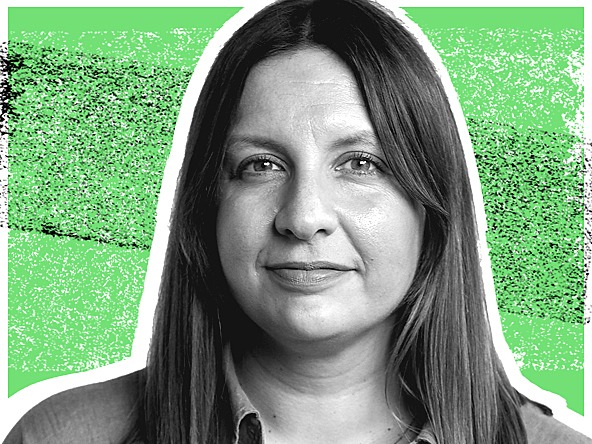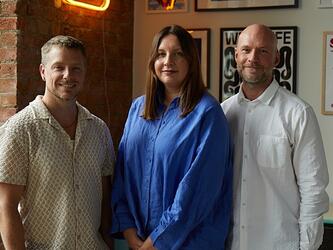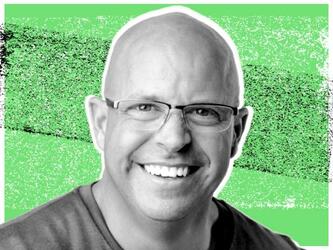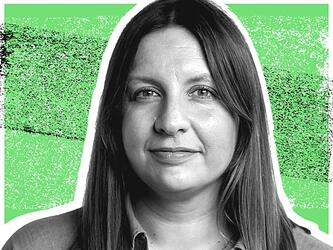Insight insiders: The Good Side’s Kathryn Blanshard on independent thinking & proving insight’s worth

What was your motivation for moving from a global company like C Space to a smaller independent agency?
I had been at C Space for 15 years and had an absolutely amazing experience there. The pull of the role at The Good Side was the chance to get into a studio that was fairly early on in the journey and the opportunity to really help them build the business – I think that is really appealing.
Also, having spent some time with their work and with them, the quality of the strategy work that they produce and their philosophy around kind of creating change and narrative change, it’s really exciting to me and I think it’s something that the industry really needs.
What sorts of clients are The Good Side working with?
We work with a mixture of commercial and non-profits. Technology and media is a specialism and a big space for us. In the non-profit space, we work with the likes of Movember – generally speaking, we try to make sure that 20% of our work is in a non-profit space.
You’re in your third week of the new role. How are you finding the change so far?
Change is good. In many ways, the core tenets of the role are similar. It’s about building and running a team and making sure that people are motivated and supported, feel like they belong, and that the work that’s going out of the door is great quality and that we're keeping an eye on the financials and revenue, so in lots of ways the building blocks are the same.
What’s been really interesting has been seeing the mixture of strategy work, campaigning and storytelling – including a feature documentary – that has been going on as we built towards an event with Movember.
We've seen a lot of consolidation in the market research space. How can independents stand out?
I think that the way that independents can stand out is in specialism. One of the drivers behind networks buying independent agencies is to in-house deep specialism. It’s about being really clear on what you're for and not trying to be everything to everyone.
In general, that’s a trend that I've been seeing for a few years from clients. Clients often have more in-house data at their fingertips and they're perhaps experimenting more with research tech. So, when they go to seek an agency partner or a studio partner, they're looking to really bring in specialist knowledge, either in that audience or in a methodology – and I think that serves independence really well, if you focus on what you're really good at and what you've got deep expertise in.
Is AI ultimately positive or a negative for independent insight businesses?
I think it’s a positive thing overall. I can only speak for The Good Side, but as an independent, it helps you to gain efficiencies and scale that otherwise might have been more difficult without becoming part of a network.
My hunch is that the advent of AI will mean that it’s even more important that agency partners are offering real impact stories and change as a result of their work, because just providing data isn’t going to cut it and I think that, speaking for The Good Side, the company is born out of the idea of creating narrative change and culture change. It’s really exciting because it gives us the opportunity to be the cherry on the top of data that clients have and complement that with deeper cultural understanding and the messy insights that you perhaps don't get through more of an AI-generated route.
"The art of storytelling, persuasion and relationships is key; we ultimately need more time to focus on that, because that’s what really moves the needle..."
What’s your initial focus going to be in the next few months?
My role, in a nutshell, is to help to codify what makes the company great and the journey so far, and then think about how we continue to grow our operations, our commercial strategy – which includes making sure that more clients get to know us both in the commercial sector and not for profit sector – and ultimately helping us to create more change in the sector.
One of the reasons the role appealed to me was that it’s it’s a very people-centric business – that’s always been something that was very important to me in my role in C Space, so it felt like a really good values fit.
What is the biggest opportunity for the insight industry now?
It goes back to what I was mentioning with AI. The industry has always grappled with the challenge of impact. How do we prove our worth? How do we move people to do something different, to change their minds, their behaviour, as a result of the insight that we share? I think that a lot of the time that doesn’t happen is because people get bogged down in the volume of data we're producing and picking out the story and the heavy operational load that comes with our industry.
The big opportunity for us now, if we really embrace AI in the right way, is the idea that it should give us more headspace to think about: “OK, well, this is what we found, and this is the ‘So what?’ Now let’s spend time thinking about how we can make that a campaign, how we can make that human truth unequivocal, so that it moves people to change their minds and act.” That, to me, is about relationships, empathy and EQ [emotional intelligence], and too often, that part of the project gets squeezed. My hope for the industry is that this allows us to be change makers – it helps us to get more impact.
The industry’s always been about science and art, hasn't it? That doesn't mean quantitative or qualitative, it’s about science and art ... the data and the story. My hope for the industry is that we don't just lean more and more into science – that we remember that the art of storytelling, persuasion and relationships is key and that we ultimately need more time to focus on that, because that’s what really moves the needle. It’s what changes behaviour and what proves the value of our work.

We hope you enjoyed this article.
Research Live is published by MRS.
The Market Research Society (MRS) exists to promote and protect the research sector, showcasing how research delivers impact for businesses and government.
Members of MRS enjoy many benefits including tailoured policy guidance, discounts on training and conferences, and access to member-only content.
For example, there's an archive of winning case studies from over a decade of MRS Awards.
Find out more about the benefits of joining MRS here.












0 Comments